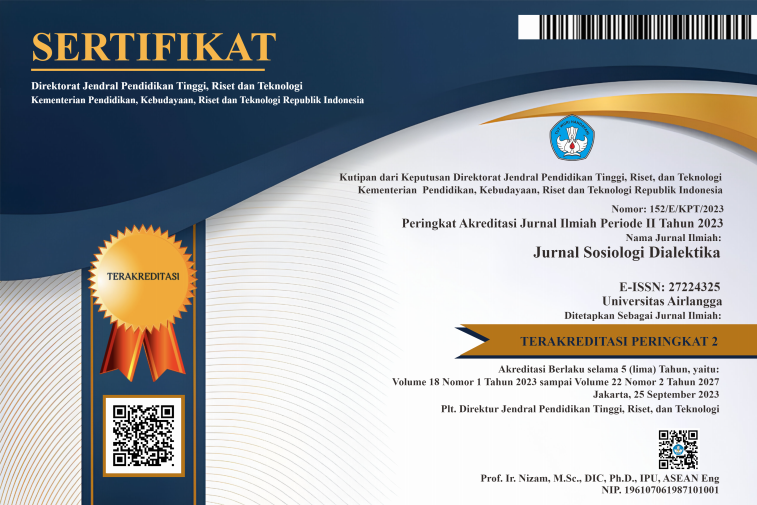Change in community behaviour in supporting sustainable development: The case of the biogas program in Ponorogo Regency
Downloads
The change in community occupation to dairy farmers and the increase in the number of livestock have caused environmental problems. This research focuses on the program’s function on changing the behaviour of the community in disposing of dairy cow manure from the phase of throwing it into the ditch to the phase of processing the manure into the biogas. This research was conducted using qualitative methods, with data collection techniques carried out through in-depth interviews, observation, documentation and literature review. The biogas problem launched by the government has proven to be able to change communities behaviour in the disposal of dairy cows manure. After receiving the biogas program, the community processed the cow dung into biogas. Interestingly, the factor that contributed the most to this behavioural change is economic. This shows that the social, environmental, and economic system have related functions and cannot be separated from each other in society. There is not much research on community behaviour change that is affected by environmental sanitation and motivated by economic factors. This study also alludes to the potential for corruption in the program. This study concludes that the biogas program is able to provide opportunities for the community to save on purchasing household fuel and minimize the waste of dairy cow waste into rivers. Apart from that, the biogas program could be a consideration for the government in creating new programs related to environmental sanitation, especially in the rural livestock industry.
Akyurek Z (2018) Potential of biogas energy from animal waste in the Mediterranean Region of Turkey. Journal of Energy Systems 2 (4):160-167. https://doi.org/10.30521/jes.455325.
Amigun B, Parawira W, Musango JK, Aboyade AO, & Badmos AS (2012) Anaerobic biogas generation for rural area energy provision in Africa. In: Kumar S (ed). Biogas. London: Intech open. 36-62. https://doi.org/10.5772/32630.
Arruzi RK & Usman S (2016) Community development and renewable energy infrastructure (A case study of utilization of biodigester in Umbulharjo, Yogyakarta). Dissertation, Universitas Gadjah Mada, Yogyakarta.
Badan Pusat Statistik Kabupaten Ponorogo (2024) Ponorogo dalam Angka 2024. Ponorogo: BPS Kabupaten Ponorogo.
Bourdin S & Nadou F (2019) The role of a local authority as a stakeholder encouraging the development of biogas: A study on territorial intermediation. Journal of Environmental Management 258: 110009. https://doi.org/10.1016/j.jenvman.2019.110009.
Capodaglio AG, Callegari A, & Lopez MV (2016) European framework for the diffusion of biogas uses: Emerging technologies, acceptance, incentive strategies, and institutional-regulatory support. Sustainability 8 (4):1-18. https://doi.org/10.3390/su8040298.
Carrosio G (2013) Energy production from biogas in the Italian countryside: Policies and organizational models. Energy Policy 63: 3-9. https://doi.org/10.1016/j.enpol.2013.08.072.
Czekała W, Gawrych K, Smurzyńska A, Mazurkiewicz J, Pawlisiak A, Chełkowski D, & Brzoski M (2017) The possibility of functioning micro-scale biogas plant in selected farm. Journal of Water and Land Development 35 (1):19-25. https://doi.org/10.1515/jwld-2017-0064.
Janczak D, Mazurkiewicz J, Czekała W, Myszura M, Kozłowski K, & Jezowska A (2019) A possibility of functioning biogas plant at a poultry farm. Journal of Ecological Engineering 20 (11):225-231. https://doi.org/10.12911/22998993/114090.
Kementerian Lingkungan Hidup (2009) Peraturan Menteri Lingkungan Hidup Nomor 11 Tahun 2009.
Kvarnström E & Mcconville J (2007) Sanitation planning-a tool to achieve sustainable sanitation? In: Huber International Symposium-Water Supply and Sanitation for All, 27-28 September, Berching. Germany: Huber International Symposium. 1-16.
Landi M, Sovacool BK, & Eidsness J (2013) Cooking with gas: Policy lessons from Rwanda’s National Domestic Biogas Program (NDBP). Energy for Sustainable Development 17 (4):347-356. https://doi.org/10.1016/j.esd.2013.03.007.
Latief R, Sutrisno E, & Hadiwidodo M (2014) Pengaruh jumlah kotoran sapi terhadap konsentrasi gas amonia (NH3) di dalam rumah (Studi kasus: Desa dalangan Kelurahan Sumogawe, Kecamatan Getasan, Kabupaten Semarang). Dissertation, Diponegoro University, Semarang.
Merton RK (ed) (1968) Social Theory and Social Structure. London: The Free Press. 73-136.
Miles MB & Huberman AM (1994) Qualitative Data Analysis: An Expanded Sourcebook (2nd ed). Thousand Oaks, California: SAGE Publications.
Minde GP, Magdum SS, & Kalyanraman V (2013) Biogas as a sustainable alternative for current energy need of India. Journal of Sustainable Energy & Environment 4: 121-132. https://ssrn.com/abstract=2431236.
Mukeshimana MC, Zhao ZY, Ahmad M, & Irfan M (2021) Analysis on barriers to biogas dissemination in Rwanda: AHP approach. Renewable Energy 163: 1127-1137. https://doi.org/10.1016/j.renene.2020.09.051.
Nugroho AC (2021) Teori utama sosiologi komunikasi (Fungsionalisme struktural, teori konflik, interaksi simbolik). Majalah semi ilmiah populer komunikasi massa 2 (2):185-194.
Nurmalina R & Riesti S (2010) Analisis biaya manfaat pengusahaan sapi perah dan pemanfaatan limbah untuk menghasilkan biogas pada kondisi risiko (Studi Kasus: Kecamatan Cisarua dan Megamendung, Kabupaten Bogor, Jawa Barat). Jurnal Pertanian 1 (1):17-34.
Obaideen K, Abdelkareem MA, Wilberforce T, Elsaid K, Sayed ET, Maghrabie HM, Olabi AG (2022) Biogas role in achievement of the sustainable development goals: Evaluation, Challenges, and Guidelines. Journal of the Taiwan Institute of Chemical Engineers 131: 1-20. https://doi.org/10.1016/j.jtice.2022.104207.
Pebrianti C (2023) Tercemar limbah kotoran sapi, Sungai Keyang Ponorogo berbau-berubah warna.Detik Jatim, 28 November. [Accessed 15 January 2024]. https://www.detik.com/jatim/berita/d-7060820/tercemar-limbah-kotoran-sapi-sungai-keyang-ponorogo-berbau-berubah-warna.
Putri AA (2023) Korupsi di Indonesia alami peningkatan dalam 3 tahun terakhir. GoodStats, 8 August. [Accessed 15 December 2023]. https://goodstats.id/article/jumlah-kasus-korupsimengalamipeningkatan-dalam-3-tahun-terakhir-UOzDZ.
Riawati N (2015) Potensi korupsi dalam kebijakan publik studi kasus korupsi program penanganan sosial ekonomi masyarakat di Provinsi Jawa Timur. Jurnal Ilmu Sosial dan Ilmu Politik 19 (2):154-168. https://doi.org/10.22146/jsp.10851.
Ritzer G & Stepnisky J (2019) Teori Sosiologi Modern Edisi 8. Yogyakarta: Pustaka Pelajar.
Rois S & Suprayitno DE (2019) Pengembangan wisata Air Terjun Pletuk Desa Jurug berbasis ekowisatakultural. In: Simposium Nasional Ilmiah & Call for Paper Unindra (Simponi) 1 (1):1134-1145.
Sasongko AB & Sulhin I (2022) Defisit modal sosial dan korupsi dana desa: Meritokrasi calon kepala desa. Journal of Mandalika Literature 3 (4):213-228. https://doi.org/10.36312/jml.v3i4.1559.
Schmidt TS & Dabur S (2014) Explaining the diffusion of biogas in India: A new functional approach considering national borders and technology transfer. Environmental Economics and Policy Studies 16 (2):171-199. https://doi.org/10.1007/s10018-013-0058-6.
Shallo L & Sime G (2018) Determinants of functional status of family size bio-digesters: Empirical evidence from southern Ethiopia. International Journal of Sustainable Energy 38 (5):493-510. https://doi.org/10.1080/14786451.2018.1538145.
Sonbait LY & Wambrauw YLD (2011) Permasalahan dan solusi pemberdayaan masyarakat melalui program biogas sebagai energi alternatif di Kabupaten Manokwari Papua Barat (Problems and solutions program for community empowerment through biogas as an alternative energy at Manokwari Regency West Papua). Jurnal Ilmu Ternak 11 (2):87-91.
Supriyanto Y (2022) Kejadian langka, air terjun di Ponorogo ditutup gara-gara tercemar kotoran sapi! Kok bisa? Travel Indozone, 5 July. [Accessed 15 January 2024]. https://travel.indozone.id/news/951268613/kejadian-langka-air-terjun-di-ponorogo-ditutup-gara-garatercemar-kotoransapi-kok-bisa.
Tigabu AD (2017) Analysing the diffusion and adoption of renewable energy technologies in Africa: The functions of innovation systems perspective. African Journal of Science, Technology, Innovation and Development 10 (5):1-10. https://doi.org/10.1080/20421338.2017.1366130.
Tigabu AD, Berkhout F, & Van Beukering P (2015) The diffusion of a renewable energy technology and innovation system functioning: Comparing bio-digestion in Kenya and Rwanda. Technological Forecasting and Social Change 90: 331-345. https://doi.org/10.1016/j.techfore.2013.09.019.
Turama AR (2020) Formulasi teori fungsionalisme struktural Talcott Parsons. EUFONI: Journal of Language, Literary and Culture Studies 2 (1):58-69.
Wahyudi J, Kurnani TBA, & Clancy J (2015) Biogas production in dairy farming in Indonesia: A challenge for sustainability. International Journal of Renewable Energy Development (IJRED) 4 (3):219-226. https://doi.org/10.14710/ijred.4.3.219-226.
Wanta D (2018) Mekanisme pendanaan digester pada program biogas rumah tangga pertama di Indonesia dengan sistem berbayar (Studi kasus). Jurnal Ilmiah Media Akuntansi 89: 83-98.

This work is licensed under a Creative Commons Attribution-NonCommercial-ShareAlike 4.0 International License.
1. Copyright of this journal is possession of Editorial Board and Journal Manager, by the knowledge of author, whilst the moral right of the publication belongs to the author.
2. Legal formal aspect of journal publication accessibility refers to Creative Commons Attribution-NonCommercial-ShareAlike (CC BY-NC-SA), implies that publication can be used for non-commercial purposes in its original form (cannot be modified).
3. Every publications (printed/electronic) are open access for educational purposes, research, and library. Other that the aims mentioned above, editorial board is not responsible for copyright violation.















